IF you are celebrating Christmas this December (or your child’s school takes part in Christmas celebrations and/or traditions) you may be interested in the Sharing Parenting Advent – top tips and suggestions for parents each day throughout Advent are below:
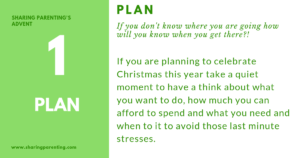
- Plan
If you don’t know where you are going how will you know when you get there?!
If you are planning to celebrate Christmas this year take a quiet moment to have a think about what you want to do, how much you can afford to spend and what you need and when, to avoid those last minute stresses.
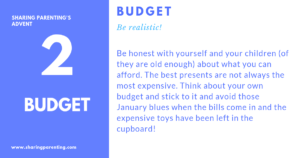
- Budget
Be honest with yourself and your children (if they are old enough) about what you can afford.
The best presents are not always the most expensive.
Think about your own budget and stick to it and avoid those January blues when the bills come in and the expensive toys have been left in the cupboard!
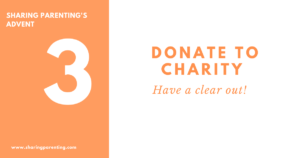
- Donate
Have a look through the cupboards and have an honest clear out. Donate to charity anything that is not being used or played with.
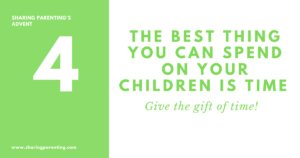
- The best thing is time
Time and happy experiences are what your children will remember when they are older – not the latest gadget or expensive toy!

- Charity buy
Visit your local charity shop to pick up some board games and presents at a fraction of the price of new ones!
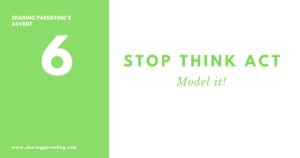
- Stop think act
Take a moment before you act. Remember to model saying sorry if you don’t act the way you want your children to!
At Sharing Parenting we share lots of tips and strategies to support parents/carers and professionals to keep the atmosphere calm and to protect children’s self esteem for now and the future adults they will become.
These are only any good if we can remember to use them at the right time (although, none of us are perfect and being reflective and saying sorry are all good characteristics of an assertive parent).
So, what can you do in the heat of the moment, when you are all ‘emotionally flooded’?
STOP THINK take a moment to calm down, count to 10, breathe and then ACT.
Our traffic lights are one of our popular handouts on our Raising Toddlers/Children/teens programmes.
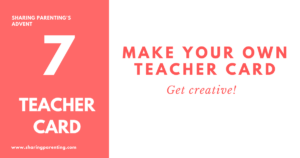
- Teacher card
If you and your child wants to give their teacher a card at Christmas ask them to start writing their name in it now.
They could draw them a picture if they want to instead – leave them to be creative!
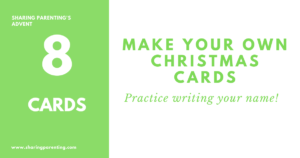
- Christmas cards
If your children want to give Christmas cards to their friends and family why not help them to make some!?
Coloured paper, felt tips, glue and stickers can be bought fairly cheaply in discount stores.
Leave them to be creative and remember they don’t need to be perfect!
Or you could buy some cheap mini cards and get them to practice writing their own name.

- Your house rules
Remind your children of your house rules and budget!
Everyone’s family is different so be honest and realistic about what you can achieve or buy!
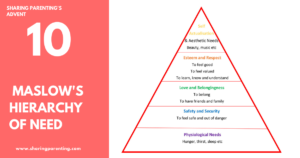
- Maslow
Have you heard of Maslow’s Hierarchy of Need?
Have you ever wondered why you can’t concentrate on anything when you are hungry or tired?
Maslow’s theories are shown on a triangle. He said unless the NEEDS at the bottom of the triangle are addressed you cannot move up the triangle.
This would explain why children are often moody when they come out of school – they are tired and need feeding!
I had a friend who greeted her twins with a banana each when she picked them up from school – she knew what they needed and how to avoid challenging behaviour on the way home!
This is also why it takes a while for children (and adults) to settle in to a new house, group or job. At first they may feel unsafe with the unknown or unfamiliar or that they don’t belong – once they start making friends and getting to know a new space just watch them thrive.
Want to know more? Book onto one of our programmes in the New Year.
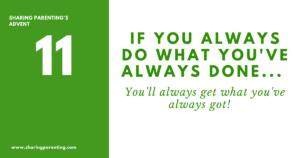
- Always do …
Try this: Fold your arms, now fold them the other way. It’s not so easy is it? Feels a bit uncomfortable and much easier to do it the way you have always done it.
Learning new parenting strategies can feel like this sometimes.
We have a saying ‘If you always do what you’ve always done, you’ll always get what you’ve always got!’
If you always do things the same way you will always get the same result (however much you will it to be different).
We share lots of tips and strategies on our programmes. Some need a little practice but are always worth the effort (and can help you remember how your children feel when they are learning new things and don’t always get it right the first time).
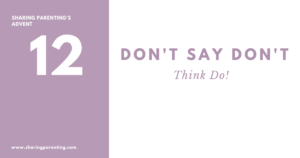
- Don’t say don’t
Don’t think of a pink elephant ….I said don’t!
It’s very hard for the brain to not picture the don’t.
Children often only hear the last 2 words of your sentence so don’t even hear the don’t – you are actually asking them to do it!
If you want them to do something ask them what you want them TO DO – stay on the path, pick up your toys, take your plate to the kitchen etc.
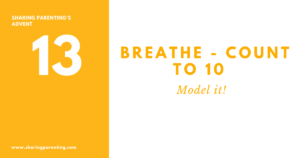
13 Model – breathe
Children need to learn how to calm down when they get emotionally flooded.
Model what you do to calm down and practice these with them when they are calm so you can remind them when they need it.
Blowing real or imaginary bubbles, counting to 10, sitting or laying down and counting your breathes are positive things to model to them.

14. Make some homemade presents
Some of the best presents are homemade. Maybe you could help your child to make some cookies or gingerbread men as a present? Tie them up with some checked ribbon and they will look even better.
Remember they don’t have to be perfect – and get them to wash their hands!
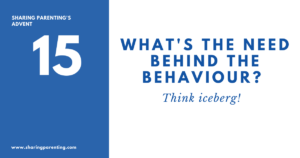
15. Need behind the behaviour
I is for Iceberg – Think of behaviour like an iceberg …. (stay with me and I’ll explain!)
The part of the iceberg you can see is the tip the hidden part is bigger (like an upside down triangle).
The BEHAVIOUR you see is often the tipping point.
There is usually something else that is behind or led to the behaviour. Are they hungry? Tired? Feeling scared or insecure? Are they feeling left out?
It’s easy to jump to the wrong conclusion or try to deal with the behaviour that is in front of you.
As a first response it’s always a good idea to feed and water them, give them some 1 to 1 time and try and listen to what might be going on for them.
We call this the NEED behind the behaviour.
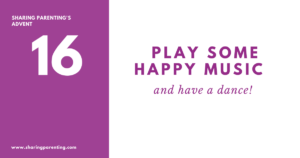
- Play some happy music
To lift mood and atmosphere play some happy music and have a dance. Your brain (and children) will thank you for it!
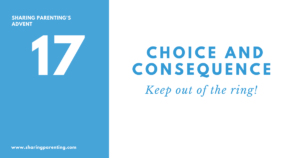
- Choice and consequence
If you feel you are always in a power struggle with your children use choice and consequence to avoid getting in the ring!
If they don’t want to get dressed ask them – do you want to wear you blue jumper or the red shirt? 2 choices is enough though!
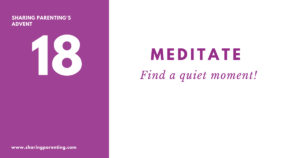
- Meditate
Model keeping calm – count to 10 or just sit quietly for a moment and think of your happy place.
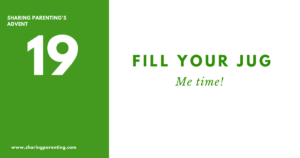
- Fill your jug
Did you know parents can be better parents when they take time out for themselves?
Imagine your energy as a jug filled with water. When you wake up (after a good nights sleep!) your jug is full.
As your day progresses you slowly empty your jug – you make the kids breakfast and spill the milk on the floor, the children remind you they didn’t do their homework, an unexpected bill comes in the post, as you leave for school your bike has a puncture – before you know it your jug is half full or empty!
How do you think you will cope now when something else goes wrong?
When our jug is empty it is difficult for us to stay calm and model the behaviour we want to see from our children.
So how are you going to fill your jug over the day?
Suggestions from parents on our programmes include: sitting down with a coffee, taking 5 minutes to look at a magazine, phoning a friend for a chat, taking a bubble bath, going for a walk, going for a swim etc.
As we refill our jug we will be more able to cope with life’s challenges and better role models for our children.
Of course life is not always perfect and it is not always possible to fill our jug when we most need it, or we start our day with an empty jug (if we have been up in the night).
On those days recognise that you are running on empty and lower your expectations for the day.
Instead of tackling the 20 things on your ‘to do’ list, be kind to yourself and only do the essentials for the day and plan (and arrange with someone who can support you) when you can next refill your jug. Your children will be glad you did.

- Be realistic
At the end of a long and exciting term children are likely to need more of your attention right now. Remember age and stage and be realistic about what you can expect from them.

21. Family traditions
What were your family traditions? Which ones do you want your children to have. If you have a partner discuss yours with them and find out theirs too.
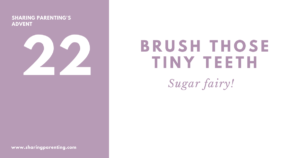
22. Brush those tiny teeth
It is likely your children will have had more sugar than usual at this time of year.
See if you can manage the amount they have and remember to encourage them to give their teeth and really good brush in the morning and before they go to bed.
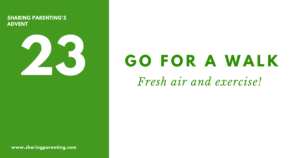
23 Go for a walk
It’s really important to get out for fresh air and exercise even if you have lots of visitors or visiting to do.
It’s always easier to manage behaviour when you’ve all been outside for a good run around – whatever the weather!
Remember there’s no such thing as bad weather – just bad clothing! Get out the wellies and umbrellas, hats and scarves and go for it!
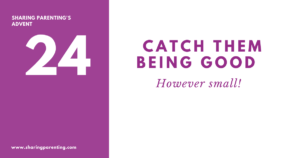
24 Catch them being good
Remember to recognise and celebrate the behaviour you want to see more of.
The easiest and fastest way to turn challenging behaviour around is to catch them being good (even if you don’t feel like it!)
If they have a big tantrum as soon as they have calmed down say “Well done for calming down now let’s ….” and move on quickly and expect the positive behaviour to continue.
If you have any of your own to share please do contact us.
You may also be interested in:
11. How to prepare your child for the excitement of the Christmas season
or
Cheap & easy Christmas Presents
or
https://www.sharingparenting.com/2020/11/04/emergency-contacts/
Contact us for more information about our programmes and parenting support.